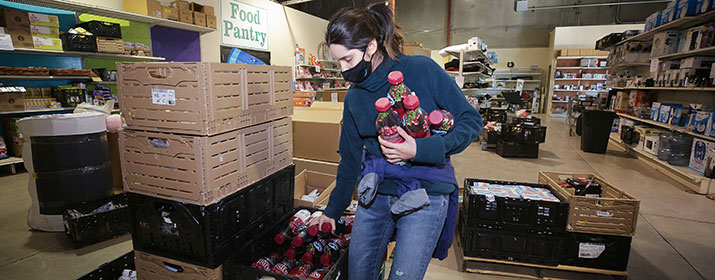
Employee-driven waste reduction and recycling initiatives will remain a key part of TEP’s sustainability efforts this year as we work to protect and preserve our environment while improving business operations.
“Our employees deserve the credit for making our company more sustainable. They’re working on some amazing projects that will help us become more ‘green’ and more efficient at the same time,” said Erik Bakken, Vice President of System Operations and Energy Resources.
TEP is preparing for a significant expansion of its internal recycling program through collaboration between Facilities Management, Risk Management and its employee-led sustainability team, UNS Employees Creating Opportunities for Sustainability (ECOS).
Although the company has long recycled aluminum cans and paper, the expanded recycling program will accommodate glass, plastic, batteries, food wrappers and polystyrene foam – products that would otherwise end up in a landfill. TEP’s Welding and Fabrication Shop even constructed special cigarette recycling receptacles.
“We have been working to develop a more comprehensive recycling program at our headquarters and we hope to expand it to other company locations across the state,” said Marianna Grigorov, a Risk Management Analyst supporting the program expansion. “We expect to formally launch the program later this year when more employees return to the building after working from home.”
TEP’s Business Services and Information Technology departments are leading a sustainable printing initiative designed to reduce paper consumption and printing costs. The team already has automated two-sided printing on some company printers to help reduce paper use. Now, the teams are considering additional measures, including reducing the overall number of printers located throughout TEP’s downtown Tucson headquarters and using only large, efficient printers centrally located on each floor.
“When employees return to the office, we’re encouraging them to keep the paperless work habits they developed while working at home because of the pandemic,” Hon said. “Although Business Services and IT are leading this initiative, employees throughout the company want to be more sustainable. So we’re encouraging them to keep their new habits and refrain from printing.”
Some sustainability initiatives will remain firmly in place. In 2017, TEP’s External Reporting Department began moving to a paperless system by using new software that converted Word and Excel documents to Adobe Acrobat (.pdf) files. The department is just one part of the Controller’s area, which produces voluminous reports every year for multiple regulatory agencies, auditors and financial filings.
In March 2020, after the pandemic hit and employees began working remotely, the entire Controller’s area moved to a paperless system. Employees received training on best practices and, by the third quarter of 2020, the entire area was completely paperless.
“Our reports used a huge amount of paper, because everything we do in accounting has to be documented with work papers, which provide evidence of the accuracy and completeness of our financial statements,” said Georgina Smith, TEP Manager of External Reporting. “We had to turn on a dime and it was painful at times but we gained so many efficiencies. We reduced overtime, eliminated hours of copying and scanning documents and saved ink and paper, all of which are huge cost savers.”
Smith said even when employees return to the workplace, they have no plans to revert to using paper again. “We are now so much more efficient and sustainable. We’ll never go back to paper.”






